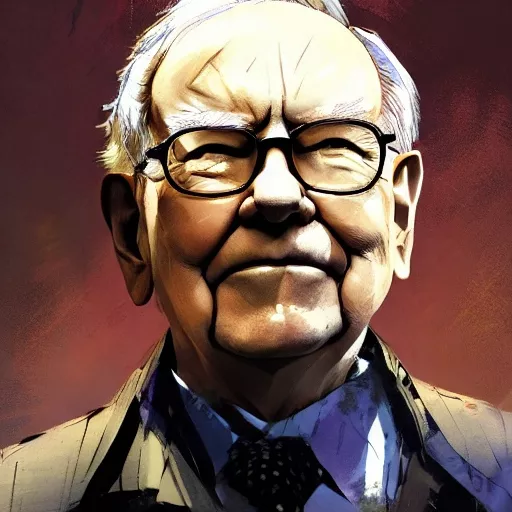Tags: Earnings
This fanpage is not officially affiliated with Berkshire Hathaway: Disclaimer

We explore Berkshire Hathaway's record operating earnings in 2022, providing an in-depth analysis of the company's financial performance, investments, and business operations. The article also examines the impact of the COVID-19 pandemic on Berkshire Hathaway's businesses and discusses the future outlook for the company, emphasizing the importance of operating earnings as a key performance indicator.
The article is based on Berkshire Hathaway's 2022 annual report.
Introduction
In 2022, Berkshire Hathaway once again demonstrated its financial prowess by achieving a record operating earnings of $30.8 billion . This multinational conglomerate, led by the legendary duo of Warren Buffett and Charlie Munger, has long emphasized the importance of operating earnings as a key metric to gauge the company's financial performance. As Berkshire Hathaway continues to thrive in the challenging global economic landscape, shareholders and financial enthusiasts alike can benefit from understanding the reasons behind this impressive accomplishment and why operating earnings are so crucial.
Operating earnings offer a more accurate picture of a company's financial health, as they exclude fluctuations caused by one-time events, accounting changes, and non-operational gains or losses. In this article, we will take a deep dive into Berkshire Hathaway's record operating earnings in 2022 and discuss the rationale behind Buffett and Munger's focus on this metric. Additionally, we will explore the flaws in relying solely on GAAP earnings, examine the performance of Berkshire Hathaway's diverse portfolio of businesses, and investigate the impact of the COVID-19 pandemic on the conglomerate. Lastly, we will provide insights into the future outlook for Berkshire Hathaway, with an emphasis on the continued importance of operating earnings.
Berkshire Hathaway's Record Operating Earnings in 2022
In 2022, Berkshire Hathaway reached a new milestone, reporting record operating earnings of $30.8 billion . This outstanding figure is a testament to the conglomerate's resilience and adaptability in the face of numerous challenges, including the COVID-19 pandemic and fluctuations in the global economy. To better understand this remarkable achievement, we need to explore the factors that contributed to the growth in operating earnings.
Factors Contributing to the Growth in Operating Earnings
Several key factors played a significant role in Berkshire Hathaway's soaring operating earnings in 2022:
- Acquisition of Alleghany Corporation : Berkshire Hathaway expanded its insurance business by acquiring Alleghany Corporation, a property-casualty insurer. This acquisition not only diversified Berkshire's insurance portfolio but also contributed to the increase in earnings.
- Increase in Insurance Float : The insurance float, representing the money held by Berkshire Hathaway's insurance companies to pay future claims, rose from $147 billion to $164 billion. This growth in float provided additional capital for investments, fueling the company's earnings, see also here
- Earnings from Diverse Businesses : The conglomerate's broad portfolio of businesses, ranging from railroads and utilities to manufacturing and retail, delivered strong performance. The earnings of Berkshire Hathaway's railroad, BNSF , remained relatively stable, while the utilities, energy, manufacturing, service, and retailing businesses experienced growth in earnings compared to previous years.
- Insurance Investment Income : After-tax earnings from insurance investment income increased in 2022 compared to 2021, attributable to increased dividend income and higher interest rates. This growth in income directly contributed to Berkshire Hathaway's overall operating earnings.
These factors, along with the astute leadership of Buffett and Munger, allowed Berkshire Hathaway to reach unprecedented heights in its operating earnings. The success of the conglomerate in 2022 is a testament to the importance of focusing on the right financial metrics and maintaining a diversified business portfolio.
The Philosophy of Charlie Munger and Warren Buffett
Warren Buffett and Charlie Munger, the guiding forces behind Berkshire Hathaway, have always advocated for a focus on operating earnings as the primary measure of a company's financial performance. This philosophy stems from their belief that operating earnings provide a more accurate and stable reflection of a business's core activities. Let's dive deeper into the reasons behind their emphasis on operating earnings and why they encourage shareholders to adopt the same approach.
Why Focus on Operating Earnings
There are several reasons why Buffett and Munger prioritize operating earnings over other financial metrics:
- Stability : Operating earnings are generally more stable than GAAP earnings, as they exclude one-time events, accounting changes, and non-operational gains or losses. This stability allows investors to better assess the ongoing performance of a company's core operations.
- Comparability : By focusing on operating earnings, investors can more easily compare the performance of different companies within the same industry. This is because operating earnings exclude items that may distort financial results and hinder accurate comparison.
- Management Insight : Operating earnings provide a clearer view of the company's management effectiveness, as they reflect the results of decisions made by management to run the business. In contrast, GAAP earnings can be influenced by factors outside of management's control, such as market fluctuations or changes in accounting rules.
- Long-term Perspective : Buffett and Munger are known for their long-term investing approach, and operating earnings are more aligned with this perspective. By concentrating on the core business activities, investors can better evaluate a company's potential for long-term growth and sustainability.
Encouragement for Shareholders
Buffett and Munger have consistently urged Berkshire Hathaway shareholders to focus on operating earnings when evaluating the company's performance. They believe that this metric offers a more accurate representation of the company's true value and long-term prospects. By emphasizing operating earnings, shareholders can gain valuable insights into Berkshire Hathaway's ongoing operations, management effectiveness, and long-term growth potential.
In summary, the emphasis on operating earnings by Buffett and Munger is rooted in their belief that this metric provides a more accurate and stable reflection of a company's financial health. By concentrating on operating earnings, shareholders can make better-informed decisions and gain a deeper understanding of the factors driving Berkshire Hathaway's success.
The Flaws in GAAP Earnings
While GAAP (Generally Accepted Accounting Principles) earnings are widely used as a financial metric, they can be misleading and fluctuate wildly at every reporting date. This volatility makes it challenging for investors to accurately assess a company's performance and long-term prospects. In this section, we will explore the reasons why relying solely on GAAP earnings can be problematic, using Berkshire Hathaway's own financial results as an example.
Examples of GAAP Earnings Fluctuations for Berkshire Hathaway
Berkshire Hathaway's GAAP earnings (i.e. earnings after taxes) have exhibited significant fluctuations over the past few years:
- 2022 : -$22.8 billion
- 2021 : $89.8 billion
- 2020 : $42.5 billion
- 2019 : $81.4 billion
- 2018 : $4.0 billion
These drastic swings in GAAP earnings make it difficult for investors to discern the company's true financial performance and long-term growth potential. As a result, Buffett and Munger have consistently advised shareholders to prioritize operating earnings over GAAP earnings when evaluating Berkshire Hathaway.
Reasons Why GAAP Earnings Can Be Misleading
There are several factors that contribute to the volatility and potential misleading nature of GAAP earnings:
- Accounting Changes : Changes in accounting rules or the adoption of new standards can significantly impact GAAP earnings. These changes may not necessarily reflect the actual performance of a company's core operations, leading to distorted financial results.
- One-time Events : GAAP earnings can be heavily influenced by one-time events, such as mergers, acquisitions, or asset sales. While these events can have a substantial impact on a company's financials, they may not be indicative of ongoing business performance.
- Non-operational Gains or Losses : GAAP earnings can include gains or losses from non-operational activities, such as investments or derivative contracts. These non-operational items can introduce significant volatility into a company's financial results, making it challenging for investors to assess the performance of the core business.
- Subjectivity : Certain aspects of GAAP earnings, such as the estimation of asset impairments or the recognition of revenue, can involve a degree of subjectivity. This subjectivity can introduce variability into financial results and make it difficult for investors to accurately evaluate a company's performance.
In conclusion, GAAP earnings can be misleading and fluctuate significantly at every reporting date, making it difficult for investors to accurately assess a company's financial performance. By focusing on operating earnings, as advocated by Buffett and Munger, investors can gain a clearer understanding of a company's core operations and long-term growth potential.
A Closer Look at Berkshire Hathaway's Businesses in 2022
Berkshire Hathaway's diverse portfolio of businesses played a significant role in its record operating earnings in 2022. In this section, we will examine the performance of each segment, shedding light on the factors that contributed to their respective earnings.
Insurance
Berkshire Hathaway's insurance operations saw several noteworthy developments in 2022:
- Acquisition of Alleghany Corporation : The purchase of property-casualty insurer Alleghany Corporation expanded Berkshire Hathaway's insurance portfolio and contributed to the increase in earnings.
- Increase in Insurance Float : The insurance float, representing the funds held by Berkshire Hathaway's insurance companies to pay future claims, rose from $147 billion to $164 billion, providing additional capital for investments.
- Underwriting Results at GEICO : In 2022, underwriting results were impacted by private passenger automobile claims frequencies and severities at GEICO, one of Berkshire Hathaway's insurance subsidiaries.
- Insurance Investment Income : After-tax earnings from insurance investment income increased in 2022 compared to 2021, due to increased dividend income and higher interest rates.
Railroad, Utilities, and Energy
Earnings from Berkshire Hathaway's railroad, utilities, and energy businesses in 2022 demonstrated mixed results:
- BNSF Earnings : Earnings from the railroad business, BNSF, were relatively unchanged in 2022 compared to 2021, but increased in 2021 compared to 2020.
- Utilities and Energy Earnings : The earnings of Berkshire Hathaway's utilities and energy business increased in 2022 and 2021 compared to the previous year, reflecting growth in this segment.
Manufacturing, Service, and Retailing
Berkshire Hathaway's manufacturing, service, and retailing businesses experienced growth in earnings across the board in 2022 and 2021 compared to the previous year.
Investments
In 2022, Berkshire Hathaway made significant investments in several stocks , including:
- Apple: Over 7.6 million shares purchased, making up more than 40% of Berkshire Hathaway's invested assets
- Activision Blizzard: An arbitrage play due to Microsoft's acquisition offer
- Citigroup and Ally Financial: Bank stocks that offer long-term profitability, especially with the Federal Reserve's monetary policy shift
- Occidental Petroleum and Chevron: Integrated oil and gas companies that can benefit from elevated energy commodity prices for years to come
- Repurchase of Shares : The strategic repurchase of its own shares added to the per-share book value for shareholders.
You may find a complete list of Berkshire's holdings in the appendix of this article.
2022 Earnings in Numbers
The following tables summarizes Berkshire's earnings in 2022, again taken from the annual report of the same year (numbers in million dollars):
| 2022 | 2021 | 2020 | |
|---|---|---|---|
| Insurance – underwriting | $(90) | $728 | $657 |
| Insurance – investment income | $6,484 | $4,807 | $5,039 |
| Railroad | $5,946 | $5,990 | $5,161 |
| Utilities and energy | $3,904 | $3,572 | $3,141 |
| Manufacturing, service and retailing | $12,512 | $11,120 | $8,300 |
| Investment and derivative contract gains (losses) | $(53,612) | $62,340 | $31,591 |
| Other (see explanations in annual report) | $2,037 | $1,238 | $(11,368) |
| Net earnings (loss) attributable to Berkshire Hathaway shareholders | $(22,819) | $89,795 | $42,521 |
As you can see, Berkshire's earnings have grown accross the board except its Railroad part and, of course, GAAP investment "losses".
In summary, Berkshire Hathaway's diverse portfolio of businesses contributed to its record operating earnings in 2022. The company's insurance, investments, railroad, utilities, and energy, as well as manufacturing, service, and retailing segments all played a part in its financial success. By analyzing the performance of each business segment, shareholders can gain a comprehensive understanding of the factors driving Berkshire Hathaway's overall growth.
Berkshire Hathaway's Record Earnings in 2022: A Historical Perspective
To fully appreciate the significance of Berkshire Hathaway's record operating earnings in 2022, it is important to place the company's achievements in a historical context. This section will explore the factors that have contributed to the company's success over the years and how these factors have shaped Berkshire Hathaway's performance in 2022.
The Legacy of Warren Buffett and Charlie Munger
Berkshire Hathaway's extraordinary success can be largely attributed to the vision and leadership of Warren Buffett and Charlie Munger. The duo has built the company's investment portfolio through a disciplined approach that prioritizes long-term value over short-term gains. Their focus on operating earnings as a more accurate reflection of a company's financial performance has guided their investment decisions and contributed to Berkshire Hathaway's impressive growth.
Lessons from the Past: Economic Crises and Berkshire Hathaway
Historically, Berkshire Hathaway has shown resilience in the face of economic challenges. During the 2008 financial crisis, the company was able to take advantage of undervalued assets and make strategic investments, including a $5 billion investment in Goldman Sachs. This ability to identify opportunities amid economic turmoil has contributed to the company's consistent growth over the years.
Similarly, during the COVID-19 pandemic, Berkshire Hathaway's diverse portfolio of businesses allowed the company to weather the storm and emerge stronger. Some businesses, such as insurance and utilities, performed well, while others, like railroads and retail, experienced more significant challenges. This diversified approach has proven to be a successful strategy for navigating turbulent economic conditions.
Embracing Change and Adapting to New Realities
Berkshire Hathaway's ability to adapt and embrace change has played a crucial role in the company's success. For example, the company's investments in technology giants like Apple and Activision Blizzard demonstrate a willingness to venture into new sectors and capitalize on emerging trends.
Furthermore, Berkshire Hathaway's acquisition of Alleghany Corporation, a property-casualty insurer, reflects the company's ability to identify strategic opportunities that align with its core strengths. This acquisition not only bolsters Berkshire Hathaway's insurance business but also demonstrates the company's capacity to grow through strategic acquisitions.
Berkshire Hathaway's record operating earnings in 2022 can be attributed to the company's long-term value-driven investment approach, resilience in the face of economic challenges, and ability to adapt and capitalize on new opportunities. By placing the company's achievements in a historical context, we can gain a better understanding of the factors that have contributed to Berkshire Hathaway's enduring success and appreciate the significance of its record earnings in 2022.
Lessons from Berkshire Hathaway's Success: Takeaways for Investors 2022
In this section, we will explore the key lessons that investors can learn from Berkshire Hathaway's success in 2022. By examining the company's strategies, investors can gain valuable insights to apply to their own investment portfolios.
Focus on Operating Earnings
One of the most significant lessons from Berkshire Hathaway's record earnings in 2022 is the importance of focusing on operating earnings, as emphasized by Warren Buffett and Charlie Munger. Operating earnings offer a more accurate reflection of a company's financial performance, as they exclude the impact of volatile elements such as investment gains and losses. By concentrating on operating earnings, investors can make more informed decisions about a company's true potential for growth and profitability.
Value Investing Principles
Berkshire Hathaway's investment approach, primarily rooted in value investing, has proven to be a successful strategy for the company. Value investing involves identifying undervalued stocks with solid fundamentals and the potential for long-term growth. By adhering to these principles, investors can potentially achieve more stable returns and reduce the impact of market volatility on their portfolios.
Diversification
Berkshire Hathaway's diverse portfolio, spanning multiple sectors and industries, has played a significant role in the company's success. Diversification helps to mitigate risk by spreading investments across a range of assets, reducing the impact of poor performance in any single sector. Investors should consider implementing a similar diversification strategy to protect their portfolios from market fluctuations and ensure a more balanced approach to risk management.
Long-term Perspective
Warren Buffett and Charlie Munger's long-term perspective has been instrumental in Berkshire Hathaway's consistent success. By focusing on the long-term growth potential of their investments, rather than chasing short-term gains, the company has been able to generate sustainable returns for its shareholders. Investors can benefit from adopting a similar long-term perspective, prioritizing the fundamental strength of their investments over short-term market movements.
Adaptability
Finally, Berkshire Hathaway's ability to adapt and seize opportunities in changing market conditions has been a key driver of its success. The company's investments in sectors such as technology and energy, as well as its strategic acquisitions, demonstrate its willingness to evolve with the times and capitalize on emerging trends. Investors should strive to be similarly adaptable, staying informed about market developments and being prepared to adjust their investment strategies accordingly.
As we have ween, Berkshire Hathaway's record earnings in 2022 offer valuable lessons for investors seeking to enhance their own portfolios. By focusing on operating earnings, adhering to value investing principles, diversifying investments, maintaining a long-term perspective, and staying adaptable to changing market conditions, investors can increase their chances of achieving sustainable, long-term success.
Emulating Berkshire Hathaway's Investment Strategies
In this section, we will explore how individual investors can emulate Berkshire Hathaway's investment strategies to enhance their own investment portfolios. By adopting some of the key principles and practices employed by Warren Buffett and Charlie Munger, investors can potentially achieve better returns and minimize risks.
Focus on Fundamentals
One of the core tenets of Berkshire Hathaway's investment philosophy is the importance of focusing on a company's fundamentals. When evaluating potential investments, consider factors such as revenue growth, profit margins, and return on equity. By concentrating on these underlying aspects of a business, investors can better identify companies with strong growth potential and avoid those that may be overvalued or facing financial challenges.
Embrace Value Investing
Berkshire Hathaway's success has largely been built on the principles of value investing. This approach involves seeking out undervalued stocks with solid fundamentals, strong competitive advantages, and the potential for long-term growth. To implement this strategy, investors should look for companies trading at a discount to their intrinsic value and offering a margin of safety. This will help to minimize downside risk while maximizing potential returns.
Diversify Your Portfolio
Diversification is a crucial component of Berkshire Hathaway's investment strategy, as it helps to spread risk across a range of assets and sectors. By diversifying your own portfolio, you can reduce the impact of poor performance in any single sector or asset class. Consider investing in a mix of stocks, bonds, and other assets, as well as diversifying across different industries and geographic regions.
Adopt a Long-term Perspective
Warren Buffett and Charlie Munger are known for their long-term investment approach, which focuses on the potential for sustainable growth over the course of years, rather than chasing short-term gains. To adopt this mindset, investors should resist the urge to react to short-term market fluctuations and instead concentrate on the fundamental strength and growth prospects of their investments. This will help to avoid impulsive decisions based on market noise and foster a more disciplined investment strategy.
Stay Informed and Adaptable
Finally, one of the keys to Berkshire Hathaway's success has been its ability to adapt to changing market conditions and capitalize on emerging opportunities. To emulate this, investors should stay informed about market developments, industry trends, and potential investment opportunities. This may involve reading financial news, attending investment conferences, or seeking the advice of experienced investment professionals. By staying informed and adaptable, investors can be better prepared to adjust their investment strategies as needed and capitalize on new opportunities as they arise.
In conclusion, individual investors can enhance their own investment portfolios by adopting some of the key principles and practices employed by Berkshire Hathaway. By focusing on fundamentals, embracing value investing, diversifying their portfolios, adopting a long-term perspective, and staying informed and adaptable, investors can increase their chances of achieving long-term success in the market.
The Impact of the COVID-19 Pandemic
Effects on Various Operating Businesses
The COVID-19 pandemic has had a significant impact on many of Berkshire Hathaway's operating businesses. Some sectors, such as retail, travel, and energy, experienced significant challenges due to decreased demand, supply chain disruptions, and the overall economic downturn. However, other sectors, such as technology and healthcare, saw growth as a result of the increased reliance on digital services and the importance of healthcare products and services during the pandemic.
Adaptation and Recovery
Berkshire Hathaway's diverse portfolio of businesses allowed it to adapt to the challenges presented by the pandemic. The company made strategic investments and divestments, focusing on businesses with strong growth potential and competitive advantages. Additionally, Berkshire Hathaway's operating businesses implemented cost-cutting measures, increased their use of technology, and adjusted their business models to meet changing consumer needs and expectations.
The Future Outlook for Berkshire Hathaway and its Investors
As we look ahead, it is essential to analyze the prospects for Berkshire Hathaway and its investors. This section will discuss the opportunities and challenges that may shape the company's future performance and the potential implications for shareholders.
Opportunities for Growth and Expansion
Berkshire Hathaway's vast and diverse portfolio provides the company with numerous opportunities for growth and expansion. The company's strategic acquisitions, such as the recent purchase of Alleghany Corporation, demonstrate its ability to identify and capitalize on value-enhancing opportunities. Additionally, Berkshire Hathaway's investments in the energy sector, including Occidental Petroleum and Chevron, signal its confidence in the long-term prospects of the industry. These investments, along with others in technology and financial sectors, may drive growth and enhance shareholder value in the coming years.
Challenges and Potential Risks
Despite the company's strong performance in 2022, Berkshire Hathaway faces several challenges and potential risks. One significant concern is the eventual transition of leadership following the tenures of Warren Buffett and Charlie Munger. The duo's investment prowess has been instrumental in the company's success, and their successors will have big shoes to fill. Investors will be closely watching how the new leadership navigates the challenges and opportunities that lie ahead.
Additionally, global economic uncertainties, such as geopolitical tensions and potential market downturns, may pose risks to Berkshire Hathaway's performance. The company's diverse portfolio may help mitigate some of these risks, but investors should remain vigilant and monitor the evolving economic landscape.
Implications for Investors
Berkshire Hathaway's future outlook remains promising, but investors should be mindful of the potential risks and challenges. As the company continues to grow and adapt to new realities, shareholders can expect to see Berkshire Hathaway capitalize on strategic opportunities and navigate economic uncertainties. Investors should also pay close attention to the company's leadership transition and assess the impact on the company's long-term prospects.
Hence, while Berkshire Hathaway's record earnings in 2022 showcase the company's strength and resilience, the future outlook depends on its ability to continue identifying value-enhancing opportunities, navigating economic challenges, and successfully transitioning to new leadership. Investors should remain vigilant and carefully consider the potential risks and rewards associated with the company's ongoing growth and evolution.
Conclusion
In summary, Berkshire Hathaway's record operating earnings in 2022 highlight the strength of its diverse portfolio of businesses and its proven investment strategies. While the company has faced challenges due to the COVID-19 pandemic, it has adapted and is well-positioned for future growth. By focusing on fundamentals, embracing value investing, diversifying its portfolio, adopting a long-term perspective, and staying informed and adaptable, Berkshire Hathaway is poised to continue its success in the years to come.
Appendix: Berkshire Hathaway's Holdings End 2022
The complete investments performed by Berkshire Hathaway in 2022 are not entirely described in the annual report and in this article. However, you may find them on the SEC Filings of Berkshire.
The colleagues at holdingschannel.com regularly provide a summary of the 13F lists, which you can use to also track changes of Berkshire's holdings.
Here's the list of Berkshire's holding as of End-2022:
| Entity | Shares Holding | Value in $1000 |
|---|---|---|
| Apple Inc | 895,136,175 | $116,305,043 |
| Bank of America Corp | 1,010,100,606 | $33,454,532 |
| Chevron Corp New | 162,975,771 | $29,252,521 |
| Coca Cola Co | 400,000,000 | $25,444,000 |
| American Express Co | 151,610,700 | $22,400,481 |
| Kraft Heinz Co | 325,634,818 | $13,256,593 |
| Occidental Pete Corp | 194,351,650 | $12,242,210 |
| Moody's Corp | 24,669,778 | $6,873,494 |
| Activision Blizzard Inc | 52,717,075 | $4,035,492 |
| HP Inc | 104,476,035 | $2,807,271 |
| Davita Inc | 36,095,570 | $2,695,256 |
| Verisign Inc | 12,815,613 | $2,632,840 |
| Citigroup Inc | 55,155,797 | $2,494,697 |
| Kroger Co | 50,000,000 | $2,229,000 |
| Visa Inc | 8,297,460 | $1,723,880 |
| Liberty Media Corp Delaware | 43,208,291 | $1,690,740 |
| General Motors Co | 50,000,000 | $1,682,000 |
| Paramount Global | 93,637,189 | $1,580,596 |
| Mastercard Inc | 3,986,648 | $1,386,277 |
| Aon Plc | 4,396,000 | $1,319,415 |
| Charter Communications Inc N | 3,828,941 | $1,298,394 |
| Bank of New York Mellon Corp | 25,069,867 | $1,141,180 |
| McKesson Corp | 2,855,514 | $1,071,160 |
| Celanese Corp Del | 9,710,183 | $992,769 |
| Amazon Com Inc | 10,666,000 | $895,944 |
| Snowflake Inc | 6,125,376 | $879,236 |
| Liberty Media Corp Delaware | 20,207,680 | $794,364 |
| Globe Life Inc | 6,353,727 | $765,942 |
| T Mobile Us Inc | 5,242,000 | $733,880 |
| Ally Finl Inc | 29,800,000 | $728,610 |
| RH | 2,360,000 | $630,568 |
| Taiwan Semiconductor Mfg Ltd | 8,292,724 | $617,725 |
| Markel Corp | 467,611 | $616,073 |
| Liberty Media Corp Delaware | 7,722,451 | $461,648 |
| Nu Hldgs Ltd | 107,118,784 | $435,973 |
| Louisiana Pac Corp | 7,044,909 | $417,059 |
| Floor & Decor Hldgs Inc | 4,780,000 | $332,831 |
| Us Bancorp Del | 6,670,835 | $290,915 |
| Stoneco Ltd | 10,695,448 | $100,965 |
| Marsh & McLennan Cos Inc | 404,911 | $67,005 |
| Johnson & Johnson | 327,100 | $57,782 |
| Procter & Gamble Co | 315,400 | $47,802 |
| Mondelēz Intl Inc | 578,000 | $38,524 |
| Liberty Latin America Ltd | 2,630,792 | $19,810 |
| Vanguard Index Fds (VOO) | 43,000 | $15,108 |
| SPDR S&P 500 ETF TR (SPY) | 39,400 | $15,068 |
| Jefferies Finl Group Inc | 433,558 | $14,862 |
| United Parcel Service Inc | 59,400 | $10,326 |
| LIBERTY LATIN AMERICA LTD | 1,284,020 | $9,759 |
As you can see, Apple, Bank of America, Chevron, Coca Cola and American Express are the most significant holdings worth more than $220 billion!









